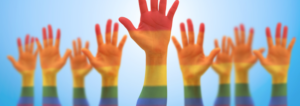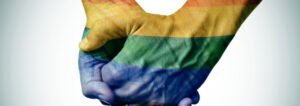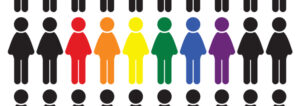What true inclusion means at KPMG
- 12 Min Read
For KPMG’s David Pearson, Pride is “the opportunity to celebrate who we are and for us to celebrate together with our allies and supporters and our families and friends”.
- Author: Lucy Skoulding
- Date published: Jul 17, 2018
- Categories

David Pearson is director of Global Inclusion and Diversity at KPMG but he also leads the firm’s LGBT network, Breathe, on a voluntary basis.

What does your role involve?
I’ve got my day job and then the role leading the LGBT network is a labour of love, which is quite common for networks within organisations. I’m the chair of the Network and I have been in the role for about the last four years. The Network itself has been around since about 2002.
What do you do in relation to the LGBT Network?
We have three pillars of the Network where we focus on activity. One focus area is Breathe in the Workplace, which consists of all the activities for our colleagues within KPMG, so it’s an internal focus on helping our people, provide networking opportunities internally plus a support network and a social network for people who want to get to know each other, whether they’re LGBT people or if they are allies or supporters.
This includes all sorts of things like a mentoring program or reverse mentoring, and a buddying system, where if someone needs an informal chat because they are having an issue in their personal life or work life in relation to being LGBT, then they can informally buddy up with someone and have a chat over a coffee.
The second pillar is Breathe in the Marketplace, which is to do with our clients and suppliers. We have a real external focus on this so we want to look at how we connect with our clients through networking events, how we can partner with clients and suppliers through events, and then there’s more strategic things we do with clients where we have an ongoing strategic program of longer term change rather than just one-off events.
The third and final pillar is Breathe in the Community, and that’s where we connect with charities and community groups and organisations and we do a range of activities. One of the groups we’re heavily involved with is called ELOP, which is an LGBT mental health charity.
What’s your view on experiences of LGBT people at KPMG and what do you think needs to be done to improve that further?
I think as an organisation, with the Network, we’re on a kind of maturity curve of LGBT inclusion. We’re probably a reasonable way along that curve because we’ve been around for 16 years. As you’ve noticed, we’ve moved beyond simply having an internal focus and we’re now in the community and the marketplace so for us it’s about how do we harness the power of our extraordinary people to help develop them further.
We actually have an aim that the future for us now is about learning, leadership, and legacy: so focusing on what Breathe means to us now. We’re in phase one of the learning – this year is called the Year of Learning for us. What we’re trying to do with the Network in 2018 is to take our people and provide them with some fantastic training opportunities. We’ve already run a number of events this year for our people in skills that are relevant to their work and also around greater LGBT inclusion. One of those is our Pronoun Day, which we ran earlier this year, where we focused a lot on how we can use language to create an environment that’s inclusive and supportive of good mental health and general wellbeing among everyone.
Next year we’re going to focus on leadership, including developing leadership with our people and then getting them to a position where they can move up through the network to become leaders of it and then 2020 is going to be the year of legacy which will equip people to create a legacy that they leave behind for others to follow.
Did you craft that initiative of three pillars yourself?
Yes I did and like most of these ideas, I got it while I was in the shower! I was thinking about how we could bring more structure to our work rather than just random events. The risk is always that they’re forgotten a week later so we’re looking at ways to make what we’re doing more coherent, so that it ties in with who we are as an organisation and our corporate strategy.
I was thinking, ‘how do we distil even further what we are trying to create’. Since then the year of learning has been adopted by the organisation so we’re collaborating with various teams across KPMG to make the learning come alive and that has been fantastic.
I spoke at Stonewall’s UK workplace conference. I gave two talks and one was on the education of all staff and the other was on engaging the senior leaders and sponsors.
What does Pride month mean to you?
Pride month means three things for me. It’s a chance for people to come together. It’s a focal point of the year and that’s important because you hear people talking about the LGBT community but really it needs to be remembered we’re not one lump so it’s all these communities having an opportunity to come together is key to me. This year we are marching with ELOP, the LGBT mental health and wellbeing charity I mentioned. We want to thank their staff and volunteers for the work they do, and give this small but vital charity more visibility.
The second thing is an element of celebration. The opportunity to celebrate who we are and for us to celebrate together with our allies and supporters and our families and friends. A lot of people think that Pride is just for gay people, which I don’t think is true. I think, if you look at London Pride for example, the people marching will include people who identify as non-LGBT and are there because they are friends, family members or supporters and people come and march with their children, you’ll have LGBT families marching with their children who may not themselves be gay. That element of togetherness and celebration is really important.
I think the third element for me is a combination of remembrance and protest. Pride itself originated as a protest march, its origins and roots are in protest against the way LGBT people were being treated, and their lack of rights and the discrimination that they faced, and we’ve lost a lot of that now because the environment has changed, the law has changed and many people feel we have moved on. Young people don’t have much awareness of its history so many people who come to Pride have no idea it started as a protest march but I think it’s important to remember LGBT history.
For me it’s three things in Pride month – the opportunity to come together, the ability to celebrate, and a reminder of where we’ve come from and the fact that people had to suffer and went through a lot of suffering in order for us to have the rights we have now.
How did you become the chair of the Network?
The previous chair had got to the point where he wanted a break. These things are a labour of love but if you’ve got a busy day job as well, it’s quite demanding to maintain the kind of activities that are required for a Network which tend to take place at night or on the weekend. I hadn’t long joined KPMG, I’ve been here since 2012, and sometime in 2013 the previous chair asked if I wanted to take over. About a year later the firm held elections for the Network lead so I stood and won.
Do you think there’s a level of frustration among the LGBTQ+ community when everyone is clumped as a group despite people having different experiences?
There’s always a challenge around identity and expressing who you are. For some LGBT people all they want to do is get on with their lives. In the work context they don’t necessarily want to focus on the fact they are LGBT but for others it is a really important part of their identity and they do want to talk about who they are freely and openly so I think it’s a balancing act. This concept of intersectionality means there’s more to all of us than our sexual orientation – that’s just one part of who we are. I think sometimes it can feel for some LGBT people that other parts of their identity are unrecognised because there is so much focus on being LGBT.
It’s kind of a paradox. It’s important not to erase someone’s identity as an LGBT person but I think it comes down to individual respect – who the individual is and what their preferences are and what their way of expressing themselves is. If you’re a disabled person you may not want your whole life to revolve around your disability but, again, it’s very important for people to recognise that you may have a disability and what that means. So it’s about balance and the key to unlocking that is to respect the individual. Respect the Individual is actually one of KPMG’s global values.
What is the key point that gets overlooked by employers when managing the LGBT community?
I think in some cases it’s very easy for employers to assume that everything is ok because KPMG is a reasonably inclusive workplace and generally across the profession most people feel they can be reasonably open about who they are. Sometimes you hear leaders talk about how great it is that LGBT people can bring their whole selves to work for example.
But what that doesn’t recognise is that for some young people it’s hard because they are in a new environment and they haven’t yet established where they sit in the pecking order, they may feel concerned about the impact it might have on their career so on the one hand it’s true we’ve come a long way but that doesn’t mean everything’s perfect. People still encounter barriers and they still need support. It’s benevolent complacency – thinking everything is ok now so we can get on when actually creating an LGBT inclusive environment is something that must be worked on every single day.
When managing particularly trans members of staff what must be considered?
I think it’s important that people seek out and become educated about trans issues. As I mentioned earlier, one of the issues we still have in the LGBT context is lack of understanding so the biggest thing I would urge is for people to seek out ways that they can become informed, and there are lots of ways to do that; you can go online or to reputable organisations to get information, training, education, and awareness.
The other thing people can do is to think about ways they can bring inclusion to life for trans people. People need to become aware and educated about ways they can create an inclusive environment regardless of whether they know any out trans people at work or not. What people are often unaware of is that many trans people are not open about their trans status and they may not know of their colleagues who are trans or they could have clients or contractors in the building who are and therefore it’s important not to assume that just because you can’t see anyone who’s openly trans that these people don’t exist.
Do you know of any non-binary employees at KPMG and if so do they have any problems with regards to pronouns?
This is a really good example of how the of that training I referred to earlier has had a real-world impact. I used to know of an openly trans person at KPMG before they left, and that person was involved in the Network and since then I’ve struggled to identify anyone who’s openly trans although I do know of at least one trans person at KPMG.
We had this pronoun day in May where we looked at how we can use pronouns and deal with the issues around how you know what pronouns to use and open up the conversation around preferences for these pronouns. So that was a really helpful event which we ran not just for KPMG people but also for external guests as well, so our clients came. After that session I was approached by the person who helped to run it who then explained that they were gender non-binary and that they were now prepared to be open about that in their office, which I think was a fantastic real-world example of how running one of those training events through our learning has actually led to someone being comfortable with being open in the office about who they are.
Our vision for the Breathe Network is inclusion for everyone everywhere. The reason for this is because at the Network we believe we can have a much wider impact than just working for people in the LGBT community we want to extend inclusion within the workplace, marketplace, and community for people no matter what their identity, whether they identify as LGBT or not. It’s inclusion for everyone everywhere.









